How to Evoke Trust on Your Landing Pages
“To be trusted is a greater compliment than being loved.” -George MacDonald
According to the Merriam-Webster Dictionary, trust is the “ belief that someone or something is reliable, good, honest, and effective”. Trust is an important emotional trigger because if a visitor does not believe you are reliable, good, honest, or effective, they are not going to want to interact with you. A visitor needs to rely on you and believe you are honest, have good intentions, and that you will provide the value you offer.
Due to the fact that emotions drive many of our purchasing decisions, and due to the fact that trust is a powerful emotional trigger that should be emphasized in almost every CRO strategy, we are dedicating an entire post to it – from what it is, to why we use it, to how we portray it online.
How is trust relevant to conversion optimization?
According to Forbes, trust is not just a singular thing. Trust is “a relationship established between a trustor and a trustee…The role of the trustor is to take risks; the role of the trustee is to be trustworthy.” So while we discuss different options for increasing trust on your site, you should remember to add only things that are true and relevant to you. If you want to be trusted, you need to be trustworthy. Being trustworthy and trusted is worth it because trust increases brand loyalty, customer development, and decreases churn. Creating loyal customers who will recommend you to their friends is definitely something to strive for because, according to 2015 statistics, personal recommendations were the most trusted form of advertising- with 83 percent of respondents stating that they somewhat or completely trusted recommendations they got from friends and acquaintances.
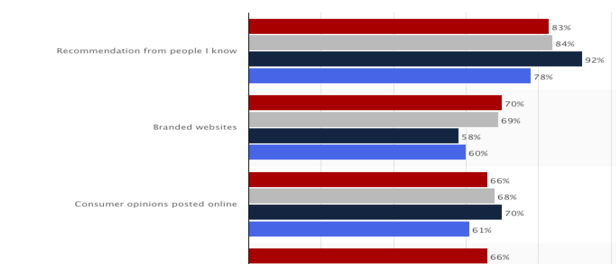
![]()
If you ask someone to leave their email in return for an e-book, they need to trust that you will actually send them that e-book and that your e-book is of high quality and will be helpful. If a user decides to purchase something from you online, they need to rely on you and believe that you will send that item to their home in an efficient manner, and that the item will be in good shape too!
As you can see, trust can motivate a customer to buy, and it can increase returning visitors as well. So trust is important for our conversion rates. However, trust is a complex emotion. How do you convey it online – without a handshake, eye contact, or a warm smile?
Think of your site as your resume. You have but a few seconds to form an impression on your customers and make them trust you with your website’s design and messaging. Below are 4 tested methods we use to increase trust for our clients:
1. Evoking Trust with Trust Seals
One way to evoke trust is with well-known trust seals, which are logos and symbols that increase credibility.
These can be:
- Security Seals – These are logos that show that your site is secure. Norton Security, McAfee Security and many others, are often used to show that your site is safe, that these companies have inspected your privacy and security level and that private details will not be compromised or shared. Baymard Institute researched which icons were perceived as most trustworthy by online users and here are the results:
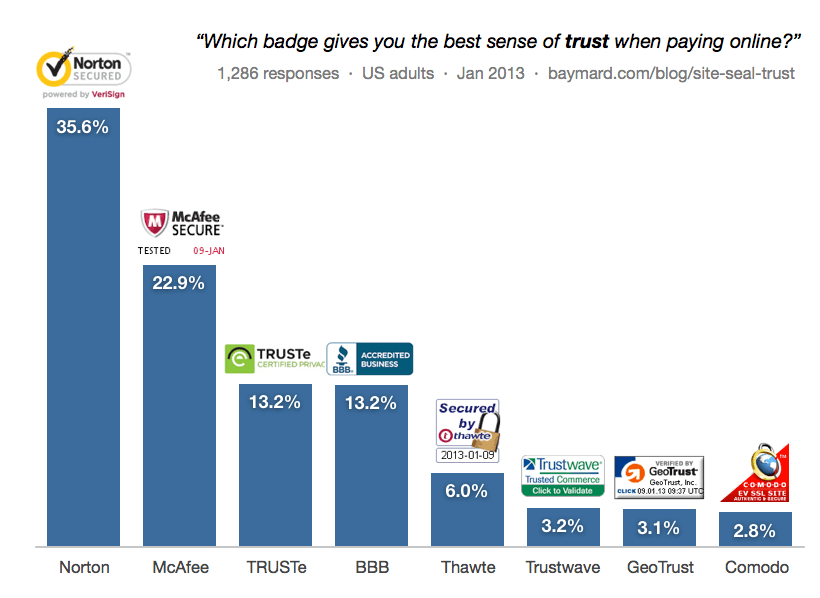
- Diplomas and approval from official organizations- This technique is used mainly by doctors, veterinarians, accountants,lawyer and other accredited professionals. Highlight the fact that your business has been certified and/or that you are certified/have a license with icons from the appropriate well-known establishments.
Express Watch, a Seiko watch dealer, originally had a ‘discount price guarantee’ symbol on their product page.
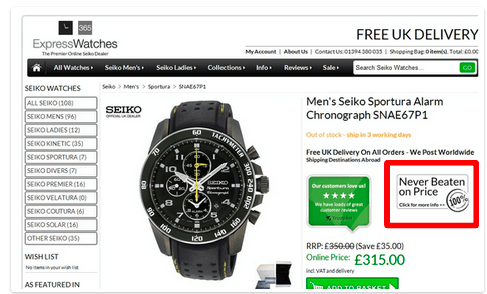
When they tested substituting it for a trust seal, stating they are an authorized dealer, their sales increased by 107%!
Variation:
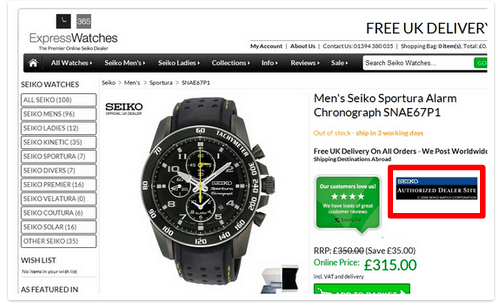
2. Evoking Trust with Social Proof
Social Proof is a powerful driver of trust. It uses the power of numbers and the “bandwagon effect” to prove that you can be trusted. Robert Cialdini discusses social proof in his book Influence: The Psychology of Persuasion and says that often times, when people do not know how to act, they look to others’ behavior to see how they should act.
- The Power of Numbers – There are a few ways you can use numbers to increase trust on your landing pages or homepage:
- Display the number of registered customers you have to show that other people trust you. Show how many others have chosen to trust you, so new visitors can see that it is safe for them to trust you too.
- Display the amount of people who have already purchased (like on Groupon – showing how many other people have already purchased this deal).
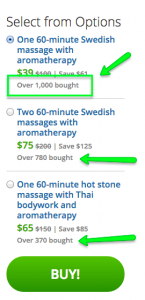
- Number of products purchased/used – Similar to the concept above, except here you are not only showing how many people have registered but how many have actually used the product. For example, MyHeritage lists how many customers they have (2.0 Billion Profiles, 79 Million Users), but also how many family trees have been created (people who actively use their product).
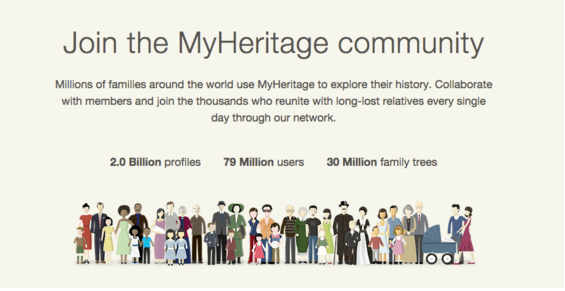 Similarly Piktochart shows visitors how many infographics have been made via their platform. This strengthens trust because it’s one thing to sign up, but it’s another to use the product. This technique shows potential customers that the product is safe, useable and can be trusted.
Similarly Piktochart shows visitors how many infographics have been made via their platform. This strengthens trust because it’s one thing to sign up, but it’s another to use the product. This technique shows potential customers that the product is safe, useable and can be trusted.
- Trust by Relevance – Have you seen those sites that talk about where they’ve been mentioned (“As featured in”, “As seen on”)? This is yet another popular form of social proof that provides credibility. I mean, if Forbes, Business Weekly, The New York Times, and Moz mentioned your product publicly, then you must be trustworthy. Having big names write about you is powerful, so show it on your site to increase trust.

Conversioner uses “As Featured On” on our homepage.
- Trust By Authority – Another way to evoke trust is to show what big names use your products and services. Some companies use celebrity faces to strengthen the trust of users in the product. You can also use authority names such as big companies that trust you enough to use your product or service. Statista shows some of their big-name clients to add social proof.
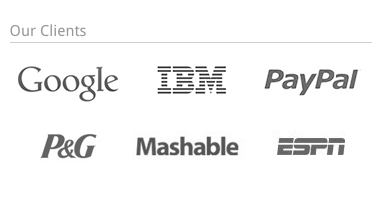
- Testimonials – What better way to prove that society trusts you than highlighting a past or current customer’s experience? When a visitor comes to your site, they are wondering whether they can trust you with their business, their credit card information, etc. By showcasing a positive customer experience other customers of yours have had, you lower anxiety. Others are working with you and enjoyed it, so they can too.
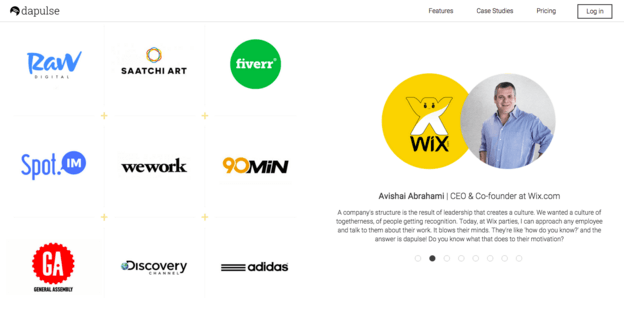
Dapulse uses both video and image testimonials, as well as naming their big customers to induce trust in potential customers.
- Reviews - These are similar to testimonials in that these are customers who are sharing their opinion, but this time it’s not you telling your users about something your customer has said to you, but rather, this is communication directly from one customer to another. This is more commonly used on eCommerce sites. Consider sites you visit just for the reviews – like TripAdvisor and Yelp. These are companies that understand how consumers choose their next purchase and make a decision according to reviews. Many customers require and even need to hear these reviews to convince them to go to a hotel/restaurant/guide-tour or to buy a frying pan. There are dangers in a negative review, but a large amount of positive reviews can have a powerful, trust-inducing effect. In fact, according to eMarketer, consumer reviews are trusted almost 12 times more than descriptions made by the company, and according to iPerceptions (2011), user reviews on a site can increase the likelihood of 63% of users to make a purchase. And if those statistics don’t convince you, according to Revoo, reviews produce an average of 18% uplift in sales!
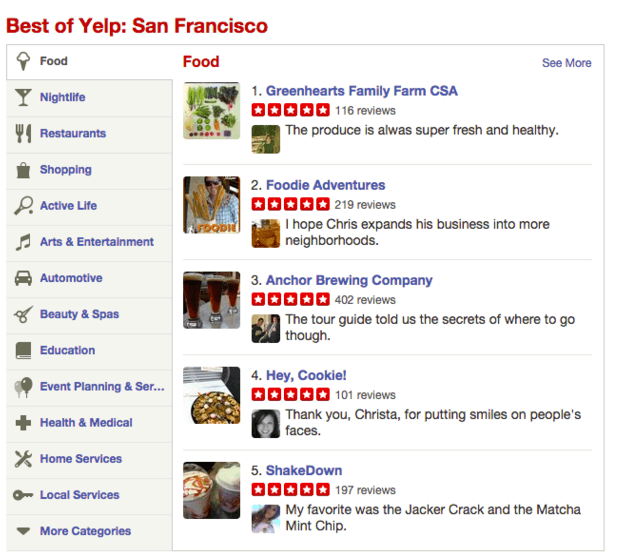
3. Evoking Trust with Colors
When it comes to color, I could tell you that blue conveys trust because it is associated with security, reliability, and authority (think IBM, Intel, General Electric, HP) but in reality, trust is conveyed by color when the color you select is compatible with the message you send. If you are selling recycled notebooks, then a bright red and yellow logo and site -focused on power and energy – may not fit well, while one with earthy browns and light greens may fit better in the user’s mind, conveying reliability and a common mind and therefore creating a sense of trust.
4. Evoking Trust with Words
Words can have a strong emotional impact, and some words can affect us differently than others. Keep this in mind when writing copy for your site to make sure that the words you use are working for you in terms of the emotions you want to trigger and the message you are trying to send.
- Transparency- When you are clear and straightforward with your customers, you can portray reliability, transparency, and therefore – trust. When the user believes that you are good, you mean them no harm, and you are reliable, they are open to building a relationship with you. So sharing facts like – “no hidden fees” or “this is how we track analytics without breaking your privacy” are great!
- At the same time, watch out for using sentences like “we won’t spam you” or “we won’t steal your data”. Be careful with the words you use and how you use them so that you do not evoke fear in customers and plant worries in their mind.

- At the same time, watch out for using sentences like “we won’t spam you” or “we won’t steal your data”. Be careful with the words you use and how you use them so that you do not evoke fear in customers and plant worries in their mind.
- Use Familiar Copy - Another concept that is discussed in Cialdini’s book, in Chapter 5, is “Liking.” This is the idea that humans tend to like people who are similar to them. If you use words that your customers are familiar with, they are more inclined to like you and feel secure with you, which is one step closer to trust. In order to use language that your visitors will find familiar and trustworthy, you can build marketing personas and get into the target audience’s mind, making sure you understand them and their emotional needs before writing. You can also send them surveys and read reviews by them for your products (or similar ones) to see the language that they use. When you use the same language that your users are using, it seems familiar and comforting. It can evoke feelings like empathy, understanding, familiarity, and inherently – trust.
“Trust is the glue of life. It’s the most essential ingredient in effective communication. It’s the foundational principle that holds all relationships.” -Stephen Covey
When your visitors trust you, they are open to building a relationship with you. They trust you with their email, their credit card, their billing address, and their google analytics data. Trust also helps you do your job more reliably so it really makes everyone happier and, in the long run, decreases churn. You can then turn this trust into a relationship, and a happy customer is a returning customer, and even better, a referring customer. So trust can bring about increased sales, increased customers, and even increased visitors.
Do you have a specific site you trust the most? What makes you trust them?


Pingback: This Week in Internet Marketing 2015 12 08 | Rise to the Top Blog()